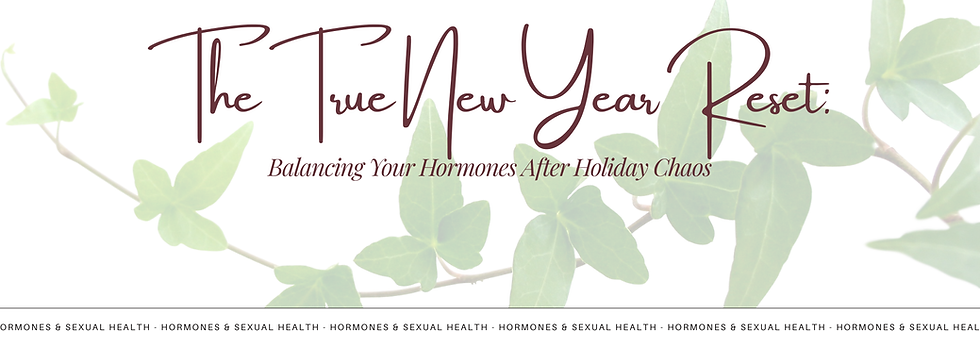Why Perimenopause Wrecks Your Sleep (and How to Get It Back)
- Aug 10, 2025
- 2 min read
Updated: Sep 2, 2025
If you’re in your 40s or early 50s and your once-dependable sleep has turned into restless nights, you’re far from alone. Sleep problems during perimenopause are incredibly common—affecting up to 60% of women. While many chalk it up to “just getting older,” the truth is there’s a lot happening under the surface with your hormones, brain chemistry, and stress response.
Let’s break it down and explore what you can do to reclaim restorative sleep.
The Hormonal Shift That Wakes You Up at Night
Perimenopause is the 4–10 year transitional phase before menopause, marked by fluctuating estrogen and progesterone levels. These shifts influence sleep in several ways:
Estrogen helps regulate body temperature, supports serotonin production (a precursor to melatonin), and can improve REM sleep. When estrogen dips, hot flashes and night sweats become more common, making it harder to stay asleep.
Progesterone is sometimes called the body’s natural “calming” hormone because it activates GABA receptors in the brain, promoting relaxation. As progesterone levels fall, it becomes harder to wind down.
Melatonin, our sleep-wake cycle hormone, also declines with age and can be further suppressed by nighttime light exposure and stress.
The Missing Piece: Cortisol and Your Stress Response
While estrogen and progesterone get most of the attention, cortisol—your primary stress hormone—often plays a starring role in perimenopause-related insomnia.
Normally, cortisol follows a daily rhythm: high in the morning to wake you up, then gradually dropping to its lowest at night.
Hormonal fluctuations, chronic stress, and blood sugar swings during perimenopause can disrupt this rhythm, leading to high nighttime cortisol—a biochemical “second wind” that keeps your mind buzzing at 1 a.m.
Poor sleep itself increases cortisol, creating a vicious cycle that can affect mood, weight, and overall health.
Science-Backed Sleep Strategies for Perimenopause
1. Balance your blood sugar. Fluctuating blood sugar can spike cortisol and adrenaline at night. Aim for protein-rich meals, and avoid sugary snacks or alcohol close to bedtime.
2. Cool your sleeping space. A room around 65°F (18°C) helps your body’s natural temperature drop that signals sleep.
3. Sync your circadian rhythm. Get morning sunlight exposure and dim lights at night to boost natural melatonin.
4. Calm the nervous system before bed. Try guided meditation, progressive muscle relaxation, or deep breathing to lower cortisol levels.
Supplements That May Help (with Your Doctor’s Approval)
Magnesium glycinate or magnesium threonate – Supports relaxation, muscle recovery, and may help with both falling and staying asleep.
L-theanine – An amino acid from green tea that promotes calm without sedation.
Ashwagandha – An adaptogen that can help regulate cortisol and improve sleep quality in some studies.
Melatonin – Can be helpful in small, short-term doses for resetting your sleep-wake cycle.
Valerian root – May reduce time to fall asleep and improve deep sleep phases.
When to Seek Professional Help
If insomnia during perimenopause is affecting your mood, work, relationships, or health, it’s worth seeing a provider who understands hormone health. Testing your sex hormones, cortisol rhythm, and nutrient levels can reveal targeted solutions—whether that’s lifestyle changes, supplements, or bioidentical hormone therapy.
Bottom line: Perimenopause may make sleep more challenging, but understanding the underlying hormonal shifts—including the cortisol connection—can empower you to take actionable steps toward deep, restorative rest.



